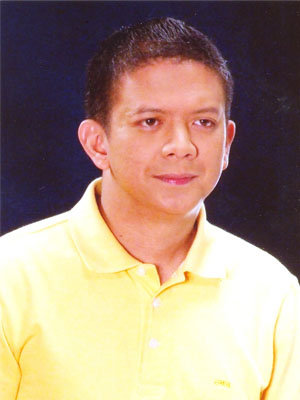Before I did my laundry last night, I instructed my younger sister, with all the seriousness and a little cockiness of an older brother, and with a slightly modulated voice as if she is one of my students enrolled in the writing classes I teach at the university, to watch the film Il Postino on my computer and to write her thoughts about the film afterward. I even went on giving her some advice on tracing the plot, taking note of the characterization, the theme, and the striking dialogue lines said by the main actors that would help her make her work worth her readers’ time.
In this case, my time.
I checked her every once in a while whether she’s doing the things I instructed her or whether she started to look bored and tired watching that Italian film. I did this in between washing my two basketfuls of dirty tees and pants, while soaking them in the detergent solution or waiting for several minutes as stated in the direction on the back of the sachet of the fabric conditioner I am wont to use before wringing my clothes one by one to remove excess water until finally hanging them to dry. At times, when she caught me doing this, she would give a spontaneous comment on the lines uttered by Mario (Massimo Troisi) or Neruda (Philippe Noiret) or ask me random questions as to why Neruda’s poems are great and enduring.
I saw her enjoying the film. I wondered how she managed to make do with my poor copy of that 1994 classic by Michael Radford.
That afternoon after I arrived from Miagao, before I could even drink water to keep me from dying of heatstroke, I didn’t know where it was coming, but she just blurted “Yan, tudlui ko magsulat be,” asking me to teach her how to write.
I always spend my weekend in the city, away from the ghost town that is Miagao, distancing myself from its deathly quiet streets that give me nothing but melancholic mirages. During these weekends I spend in the city, I do my stuff and my sister does hers. We try not to get in the way of each other’s paths. Her request, and of all, teaching her how to write, was something I least expected.
I know she reads my blog as some sort of a side trip whenever she does research for her requirements in school or when she’s facebook-ing to pass time. However, I did not expect that the things I wrote on my site will motivate her to try writing, that’s my assumption, at least.
When she said, “Yan, tudlui ko magsulat be,” I seriously tried to keep my composure intact and my voice unaffected although deep inside I was already unable to contain that feeling of unusual upwelling I only have if something life-changing is occurring before my eyes. I almost hugged her.
A writer is an ordinary person, perhaps he is more sensitive. People who are highly sensitive are often more frail. I am frail, this must have been my main reason why I write. As for my sister, much as I would like to keep her from suffering this frailty brought by hypersensitivity that writing will eventually bestow on her; I cannot bring myself to deny her that voice, that affirmation of her own self validated during the act of writing.
Looking back, I have unconsciously created a thirst for writing in her.
I know one can only write literature, or even to simply begin writing, if he or she is exposed to great writings. I realized all these time I have unwittingly left my books in her humble place in the city for this expressed purpose.
Whenever I finish reading my books, serious ones on particularly technical topics or works of fiction, I would bring them to her place in the city and leave them there hoping that she would find interest in reading all of them as much as I did. Although I never attempted to impose on her the books I read, or reading in general, I consciously, but more often unconsciously, made her know that I am happy whenever I see her reading or that she enjoys the books I leave at her place.
Sometimes, when I am gripped with what I’m reading, I would shamelessly tell her how enmeshed I am in the plot of the story, how involved I am in the lives of the character, or how passionately I feel about the arguments of the author, even discussing with her the main points of the book unmindful that I have not given her the shallowest of context.
I am of the opinion that good writing cannot be taught, it can only be nurtured. Based on her papers she submitted for her course, which I secretly read because she wouldn’t let me read them for fear of my harsh criticism, I suppose, my sister has all the promise of a good writer only that she needs a little bit prodding and confidence to share her honest attempts to express her thoughts in writing.
Il Postino has all the simplicity and lyricism to inspire anyone, even those who find writing mundane, to try experimenting with words, metaphors, and images.
“How would you describe a net?” Pablo Neruda asks the postman, Mario Ruoppolo.
“My father’s net?”
“Yes.”
His response, the simplest yet the most powerful:
“Sad.”
The first lesson I gave before she started writing: Write in the simplest of terms.
My sister, Gemini, is an AB English sophomore at West Visayas State University in La Paz, Iloilo City.














